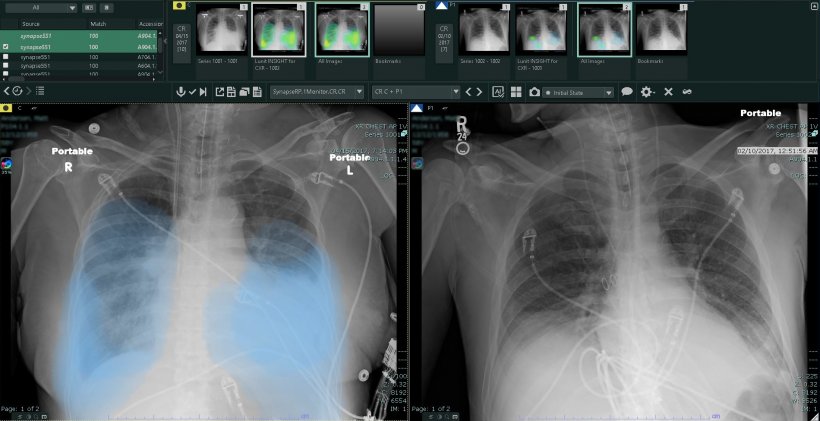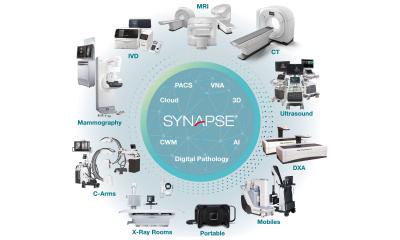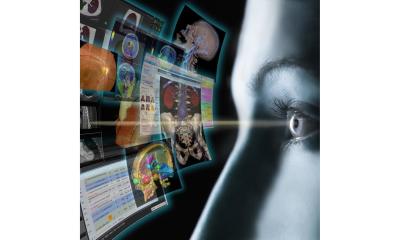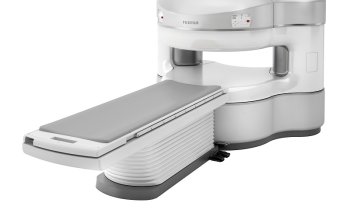News • Artificial intelligence in imaging
Using AI to support operators against COVID-19
Artificial Intelligence is an essential tool for the healthcare operators on the front line in the fight against the Coronavirus pandemic. ASST Vimercate Hospital chose and implemented in the midst of the COVID-19 emergency REiLI, Fujifilm Medical Systems’ Artificial Intelligence.
During the novel Coronavirus emergency, operations and workflows in all Italian hospitals were disrupted, which significantly increased workloads. As a consolidated partner of Vimercate, Fujifilm wanted to ensure its cutting-edge tools were available to reduce the impact caused by the rapid spread of COVID-19 and to give a timely response to the spread of the pandemic.
All images that artificial intelligence identified as suspected COVID-19 were subjected to processing by the radiologist in a faster and more urgent manner
Marcello Intotero
In November 2019, a collaboration agreement between ASST of Vimercate and Fujifilm was signed with a view to exploring new approaches to the treatment of patients, with benefits both to the clinical services and to healthcare operators. “REiLI's support,” says Marcello Intotero, Head of Radiology Structure and Diagnostic Services Department, “has allowed our radiologists to report examinations with greater speed and efficiency. In numerical terms, their workloads have not particularly increased, as other causes for non-urgent examinations were limited to avoid an excess flow of patients. This new technology has given great support to the workflow; all images that artificial intelligence identified as suspected COVID-19 were subjected to processing by the radiologist in a faster and more urgent manner than other images which, instead, the system analyzed as corresponding to a healthy lung.”
REiLI’s processing of CT scans and chest x-rays provides important support for radiologists, offering them an extremely rapid, quantitative and objective assessment of the various zones of the lungs. The chest x-ray, in particular, is the best example of applying the new AI technology, in that it is a quick and simple examination which provides a large amount of useful information for evaluating the presence of the pulmonary parenchymal consolidation caused by the virus.

The data obtained from artificial intelligence does not replace the molecular diagnoses performed using the nasopharyngeal swab (RT-PCR) and, above all, nor does it replace the precious analyses and diagnoses performed by the radiologist. The data, however, does provide support in reporting on daily examinations conducted to monitor and study the development of the disease, and constitute a second opinion for the operators. REiLI, Fujifilm’s Artificial Intelligence platform, is integrated with the Lunit Insight CXR module for the analysis and detection of the main types of pulmonary disease (nodules, atelectasis, fibrosis, calcifications, cardiomegaly, etc.). In fact, the Lunit Insight CXR3 module has been updated to provide support in specifically identifying the pulmonary parenchymal consolidation caused by the virus.
REiLI has been installed at ASST Vimercate in just two weeks, by installing a parallel PACS to avoid interrupting the daily workflow. On 30 March, REiLI was already operating and during its first five days it had worked on more than 600 images. During the emergency, more than 900 positive cases of COVID-19 were found, with an average of 80 chest x-rays per day, allowing precise and punctual data collection. “During the health emergency, more than 80 chest x-rays of inpatients and first-aid patients have been analysed each day at the Vimercate Hospital," explains Giovanni Delgrossi, Head of IT Department, ASST Vimercate. “If no priority is set for the examinations to be reported, it may take hours to identify a particular x-ray which could require prompt, immediate action from doctors. In an emergency like the current one, we need to react and act even more quickly.”
“Alternative Intelligence is a new operating concept projected towards collaborative intelligence between machine and man,” explains Nicola Bilibio, Clinical Specialist Medical Informatics (CSE) Fujifilm Europe GmbH. “This is a fundamental tool for optimizing the workflow and for screening patients from COVID-19. During the emergency, we promptly made our most advanced technologies available to make our concrete contribution to the crisis.”
Source: Fujifilm Europe
06.07.2020









